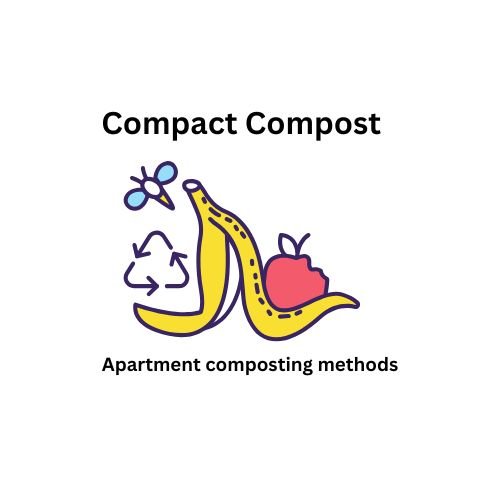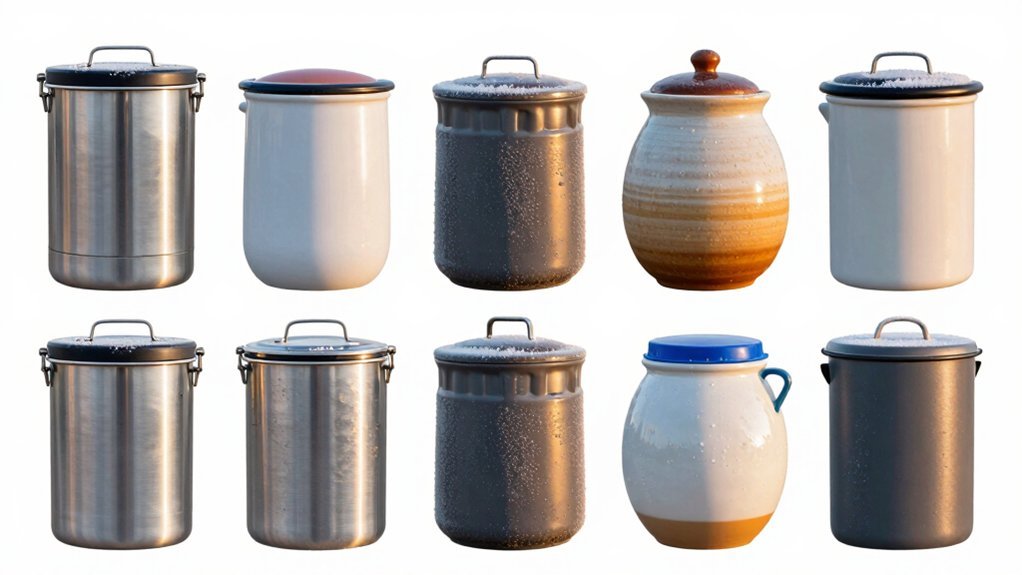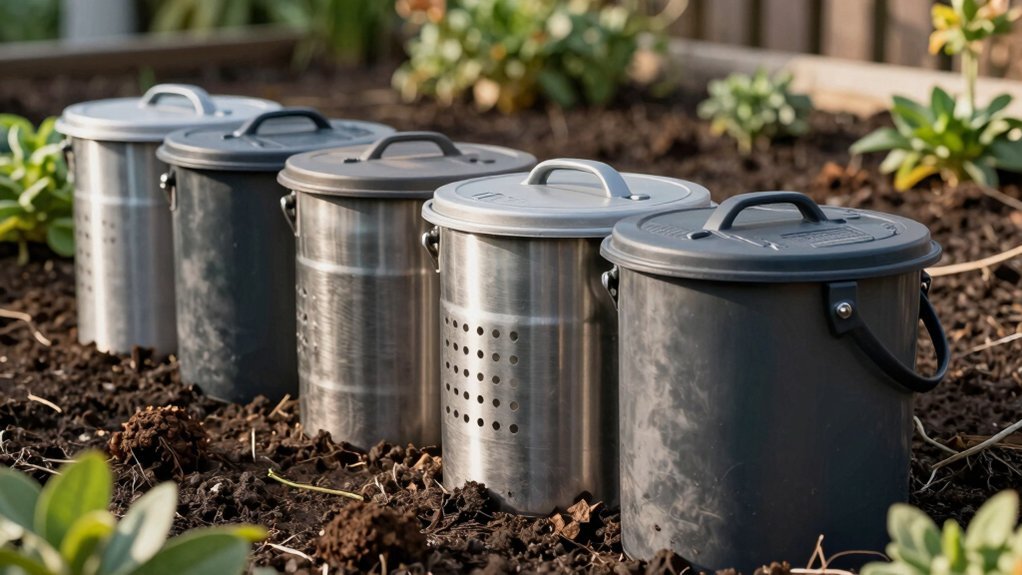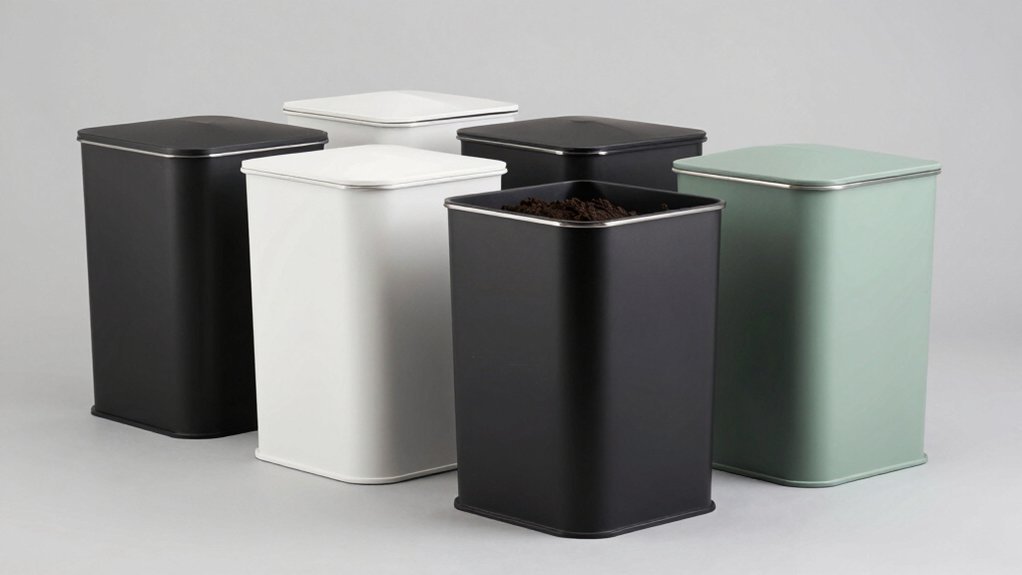You're about to discover the most effective replacement parts that'll keep your indoor composting system running smoothly in 2025. From activated charcoal filters to durable stainless steel components, we've tested and compared the top options to help you maintain an odor-free kitchen. Whether you're upgrading your current setup or preparing for maintenance, these expert-vetted selections will guarantee your composting journey stays hassle-free and environmentally conscious.
7.25" Kitchen Compost Bin Charcoal Filter Replacements
The 5" Kitchen Compost Bin Charcoal Filter Replacements are ideal for composters who need a smaller filter solution for compact kitchen bins. While these 5" filters are more compact than their 7.25" counterparts, they offer the same premium activated charcoal technology for effective odor control.
You'll find these filters easy to install and maintain, requiring replacement every 2-3 months. They're designed to trap unwanted smells and even help keep fruit flies at bay. If you're working with a custom-sized bin, you can trim these filters to achieve a perfect fit. Like their larger versions, they'll keep your kitchen fresh while maintaining excellent value for money.
Best For: Home composters seeking effective odor control for standard-sized kitchen compost bins who want a reliable, high-quality filter solution.
Pros:
- Premium activated charcoal effectively traps and eliminates compost odors
- Can be trimmed to fit various bin sizes
- Long-lasting filters with 2-3 month replacement cycle
Cons:
- May be slightly larger than advertised and require trimming
- Needs regular replacement every 2-3 months
- Higher initial cost compared to basic filter options
6.7inch Charcoal Filters for Kitchen Compost Bin
Homeowners seeking reliable odor control for their kitchen composting will find these 6.7-inch charcoal filters indispensable. The 12-pack of 5mm thick activated charcoal filters effectively traps food odors while maintaining fresh indoor air. They're compatible with most standard-sized compost bins featuring domed lids.
You'll appreciate the durability of these filters, which outlast many competing brands. While they can be trimmed for custom fits, it's best to avoid rinsing them to preserve their effectiveness. Replace your filters every 2-3 weeks for peak performance. At a competitive price point and with over 4,600 positive customer reviews, these Beacozofu filters offer excellent value for your composting needs.
Best For: Home composters who need reliable, cost-effective odor control for their kitchen compost bins and value convenience with a bulk pack of filters.
Pros:
- Excellent odor control with thick 5mm activated charcoal construction
- Versatile fit for most standard compost bins with option to trim for custom sizes
- Great value with 12 filters per pack and longer-lasting performance than competitors
Cons:
- Cannot be rinsed or washed without risking damage to the filters
- Requires replacement every 2-3 weeks for optimal performance
- May need trimming to fit some containers, which can be inconvenient
2 Years Supply Extra Thick Kitchen Compost Bin Filters (6 Pack)
Eco-conscious composters seeking superior odor control will find these extra-thick filters an ideal solution for their kitchen bins. With a dense 0.4 activated charcoal layer and 20-micron particle size, these filters eliminate odors more effectively than standard options.
You'll get two years of protection with this 6-pack, and the 7.25" round filters fit 99% of US compost bins. If you need a custom fit, included templates make cutting simple. The filters come in biodegradable, resealable bags to maintain freshness, and you'll want to replace them every 4 months for peak performance. They're especially effective in metal bins and backed by a satisfaction guarantee.
Best For: Environmentally-conscious home composters who want long-lasting, effective odor control for their kitchen compost bins.
Pros:
- Extra thick activated charcoal provides superior odor absorption compared to standard filters
- Universal 7.25" size fits most bins, with included templates for custom cutting
- Two-year supply with biodegradable packaging demonstrates good value and eco-friendly commitment
Cons:
- May require cutting and adjustment to fit some bin sizes
- Needs replacement every 4 months for optimal performance
- Initial cost might be higher than basic filter options
RED FACTOR Charcoal Filters for Kitchen Compost Bins (8 Pack)
Composting enthusiasts seeking reliable odor control will find their solution in RED FACTOR's 8-pack charcoal filter set. You'll get four round (6.50-inch) and four square (4.5-inch) filters, each measuring 0.4 inches thick to fit most bins.
These activated carbon filters effectively neutralize odors from all food scraps, even during hot weather. They're easy to replace – just pinch out the old one, clean the lid, and insert the new filter. Each filter lasts 3-4 months, giving you over a year of odor-free composting. While you can't wash them, you can trim them to fit your bin perfectly. If you're not satisfied, RED FACTOR offers a full refund.
Best For: Eco-conscious home composters who want long-lasting, effective odor control for their kitchen compost bins without frequent filter replacements.
Pros:
- Excellent value with 8 filters providing over a year of use
- Versatile sizing options with both round and square filters that can be trimmed to fit
- Highly effective activated carbon technology for complete odor neutralization
Cons:
- Filters cannot be washed or reused once saturated
- May need to be cut to size depending on bin model
- Requires replacement every 3-4 months for optimal performance
10 Pack Charcoal Filters for Kitchen Compost Bin
Anyone seeking a reliable solution for kitchen compost odors will find these 10-pack charcoal filters indispensable. Made from premium activated charcoal, these 6.7-inch filters effectively trap and neutralize food smells for up to 4 months.
You'll appreciate their versatile cut-to-fit design, compatible with most standard domed lids. At 5mm thick with 20-micron particle size, they deliver superior odor control while being 100% biodegradable. You won't need to rinse them – just replace every 2-3 months for peak performance.
If you're not satisfied, you're backed by a full refund guarantee. These filters are perfect if you're eco-conscious and want to maintain a fresh-smelling kitchen year-round.
Best For: Eco-conscious home composters who want an effective, long-lasting solution for controlling kitchen compost bin odors while maintaining a fresh-smelling kitchen environment.
Pros:
- Long-lasting performance with up to 4 months of effective odor control
- Versatile cut-to-fit design works with most standard compost bin lids
- 100% biodegradable and environmentally friendly materials
Cons:
- Requires regular replacement every 2-3 months for optimal performance
- Cannot be rinsed or cleaned for extended use
- 6.7-inch diameter may not fit all compost bin sizes without modification
EPICA Stainless Steel Countertop Compost Bin
Homeowners seeking a sleek and reliable composting solution will find the EPICA Stainless Steel Countertop Compost Bin an excellent choice. This high-grade stainless steel bin holds 1.3 gallons of organic waste and features an airtight lid with a charcoal filter that lasts over six months.
You'll appreciate its compact 7.16" x 11" design that fits perfectly on your countertop while controlling odors effectively. The one-piece molded construction prevents food from getting trapped in crevices, making cleanup a breeze. With over 19,000 positive reviews and a 4.7-star rating, this bin's durability and functionality make it a standout choice for both composting veterans and beginners.
Best For: Eco-conscious homeowners and apartment dwellers looking for a durable, odor-free solution to collect kitchen scraps for composting while maintaining a stylish kitchen aesthetic.
Pros:
- Premium stainless steel construction ensures long-lasting durability and resistance to rust
- Effective odor control system with replaceable charcoal filter and airtight lid
- Easy-to-clean design with no crevices for food to get trapped
Cons:
- Higher price point compared to plastic alternatives
- Requires regular filter replacement for optimal odor control
- May be too small for larger households that generate more kitchen waste
Kitchen Compost Bin Charcoal Filter Replacements (7.25 inch)
The premium activated charcoal filters, measuring 7.25 inches in diameter, provide an essential upgrade for indoor composting enthusiasts who want to maintain a fresh-smelling kitchen.
These 0.2-inch thick filters effectively trap odors and keep fruit flies at bay. You'll get eight filters in each set, offering excellent value for your composting needs. While they're designed for domed-lid stainless steel pails, you can easily trim them to fit your specific bin.
Replace your filters every 2-3 months to maintain peak performance. Users consistently praise these filters' snug fit and impressive odor control capabilities, making them a reliable choice for maintaining a pleasant kitchen environment while composting.
Best For: Home composters who want an effective, long-lasting solution for controlling odors in their kitchen compost bins while maintaining a fresh-smelling environment.
Pros:
- High-quality activated charcoal effectively traps odors and prevents fruit fly issues
- Pack of 8 filters provides excellent value with 2-3 months lifetime per filter
- Versatile fit for most standard compost bins with ability to trim for custom sizes
Cons:
- May require trimming to fit some compost bin models
- Needs replacement every 2-3 months for optimal performance
- Slightly larger than advertised dimensions which could be inconvenient for some users
Factors to Consider When Choosing Indoor Compost Bin Replacement Parts
When you're shopping for indoor compost bin replacement parts, you'll need to match the exact filter size and material specifications to guarantee proper fit and functionality. The quality and durability of materials, combined with their odor-control capabilities, will determine how effectively your composting system performs and how often you'll need replacements. Consider how easily the parts install in your specific bin model, as proper alignment and secure fit are essential for maintaining an odor-free composting environment.
Filter Size and Compatibility
Selecting the right filter size for your indoor compost bin requires careful attention to measurements and compatibility factors. You'll need to measure your bin lid's diameter precisely, as filters typically come in standard sizes like 6.7 or 7.25 inches.
While most filters are designed to be trimmed for a custom fit, it's best to choose one that's slightly larger than your bin's dimensions. Pay attention to the filter's thickness, which ranges from 0.2 to 0.4 inches – thicker options provide better odor control. Make sure the filter you select matches your bin's material and design, particularly if you have a stainless steel or plastic bin with a domed lid. Remember to replace your filters every 2-4 months to maintain effective odor control and peak performance.
Material Quality and Durability
Maintaining ideal performance of your indoor compost bin depends heavily on choosing high-quality, durable replacement parts. When selecting activated charcoal filters, look for thicker, premium options with dense structures, as they'll provide superior odor absorption and last longer than thinner alternatives.
You'll want to focus on replacement parts that offer consistent performance for 2-4 months, depending on your usage patterns and environmental conditions. Premium activated charcoal filters with robust construction will effectively trap odors and maintain freshness throughout their lifespan. To align with eco-friendly practices, opt for biodegradable materials that don't compromise on quality or functionality.
Remember that investing in high-quality replacement parts now can save you money in the long run, as they'll require less frequent replacements and deliver better performance.
Odor Control Effectiveness
Strong odor control stands as a primary factor when choosing replacement parts for your indoor compost bin. When selecting replacement filters, you'll want to focus on activated charcoal options with sufficient thickness, as these provide superior absorption of food odors and maintain better indoor air quality.
To maximize odor control effectiveness, you'll need to guarantee your replacement filters fit snugly in your specific bin model. Even in warmer conditions, high-quality charcoal filters can eliminate unwanted smells completely. Don't forget to mark your calendar for filter replacements every 2-4 months, as their performance naturally decreases over time. By maintaining regular filter changes and choosing the right thickness for your composting needs, you'll create a more pleasant indoor composting environment free from offensive odors.
Replacement Frequency Requirements
While different compost bin models have varying requirements, you'll generally need to replace charcoal filters every 2-3 months to maintain peak performance. Some premium filters can last up to 4 months, depending on your usage patterns and kitchen environment.
You'll know it's time for a replacement when you notice reduced odor control or visible wear on your filters. If you're using your compost bin in a warm kitchen or adding food scraps frequently, you might need to replace filters more often. While some users try to extend filter life through maintenance, it's best not to push beyond recommended intervals.
Keep track of when you install new filters and monitor their effectiveness. This proactive approach will help you maintain a fresh-smelling kitchen and ideal composting conditions.
Installation and Fit Options
Before purchasing replacement parts for your indoor compost bin, you'll need to carefully evaluate several fit and installation factors. Start by measuring your bin's dimensions precisely, as filter sizes must match or be adaptable to your specific model. If you have a domed lid or unique design, verify the replacement parts are compatible with these features.
Consider filter thickness when selecting parts, as thicker options deliver superior odor control and don't need replacing as frequently. You'll want to check if the filters can be easily trimmed to fit your bin's specifications without compromising their effectiveness. When installing new components, look for parts made from biodegradable materials to maintain your commitment to eco-friendly practices. This attention to proper fit and installation will maximize your composting system's performance and minimize maintenance issues.
Environmental Impact Considerations
Since environmental consciousness drives many composting practices, choosing eco-friendly replacement parts for your indoor compost bin greatly impacts sustainability efforts. You'll want to select biodegradable materials whenever possible, particularly for components that need frequent replacement like filters.
Opt for activated charcoal filters that naturally break down while effectively controlling odors. When evaluating replacement parts, consider their complete lifecycle – from manufacturing to disposal. You'll make a bigger positive impact by choosing components made through sustainable production methods, which help reduce your carbon footprint.
Don't forget to maintain a regular replacement schedule for your bin's parts. While it's important to keep your composting system running efficiently, you can do so while prioritizing eco-friendly options that align with your commitment to environmental stewardship.
Price Per Filter Value
Several key factors influence the price-per-filter value when selecting replacement parts for your indoor compost bin. While you'll find filters ranging from $0.50 to $2.00 each, it's crucial to look beyond the initial cost.
You'll get better value by purchasing multi-filter packs, which typically offer significant savings per unit. Consider that thicker, higher-quality filters often justify their premium price through extended lifespan and superior odor absorption. Since you'll need to replace filters every 2-4 months, investing in durable options can reduce your long-term expenses.
When evaluating filter costs, factor in the total replacement schedule. A pricier filter that lasts longer may prove more economical than cheaper alternatives requiring frequent changes. Your best value often lies in balancing quality with cost-effective bulk purchasing options.
Thickness and Absorption Capacity
When choosing replacement filters for your indoor compost bin, the thickness and absorption capacity directly impact their effectiveness. You'll find that filters range from 0.2 to 0.4 inches thick, with thicker options delivering superior odor control and longer lifespans of up to 4 months.
Look for filters with dense activated charcoal layers, as they're more effective at trapping and neutralizing food odors. The size of charcoal particles matters too – smaller particles around 20 microns provide greater surface area for odor absorption. For ideal performance, you'll want to replace your filters every 2-3 months, regardless of thickness. If you're seeking maximum odor control, opt for filters closer to the 10mm (0.4-inch) range, as they typically offer better absorption capacity and require less frequent replacements.
Frequently Asked Questions
How Often Should I Clean My Indoor Compost Bin Between Filter Changes?
You'll want to clean your indoor compost bin every 1-2 weeks with soap and water, even between filter changes. This helps prevent odors, fruit flies, and bacteria buildup while keeping your composting system running smoothly.
Can I Reuse or Wash Charcoal Filters to Extend Their Lifespan?
You can't effectively wash or reuse charcoal filters, as they lose their odor-absorbing properties once saturated. It's best to replace them according to manufacturer guidelines, typically every 3-4 months for ideal performance.
What Signs Indicate My Compost Bin Filter Needs Immediate Replacement?
You'll know it's time to replace your filter when you notice strong odors despite a clean bin, visible mold growth, or if the filter's visibly damaged. Don't wait if it's soaked or falling apart.
Are Generic Charcoal Filters as Effective as Brand-Specific Replacement Filters?
While generic charcoal filters can work, you'll get better odor control with brand-specific filters since they're designed to fit perfectly and meet your bin's exact specifications. Don't risk compromising your composting with ill-fitting alternatives.
How Should I Store Unused Replacement Filters to Maintain Their Effectiveness?
Keep your unused filters in a sealed plastic bag or airtight container in a cool, dry place. You'll want to avoid moisture and humidity, which can reduce their effectiveness and cause premature deterioration.





Leave a Reply